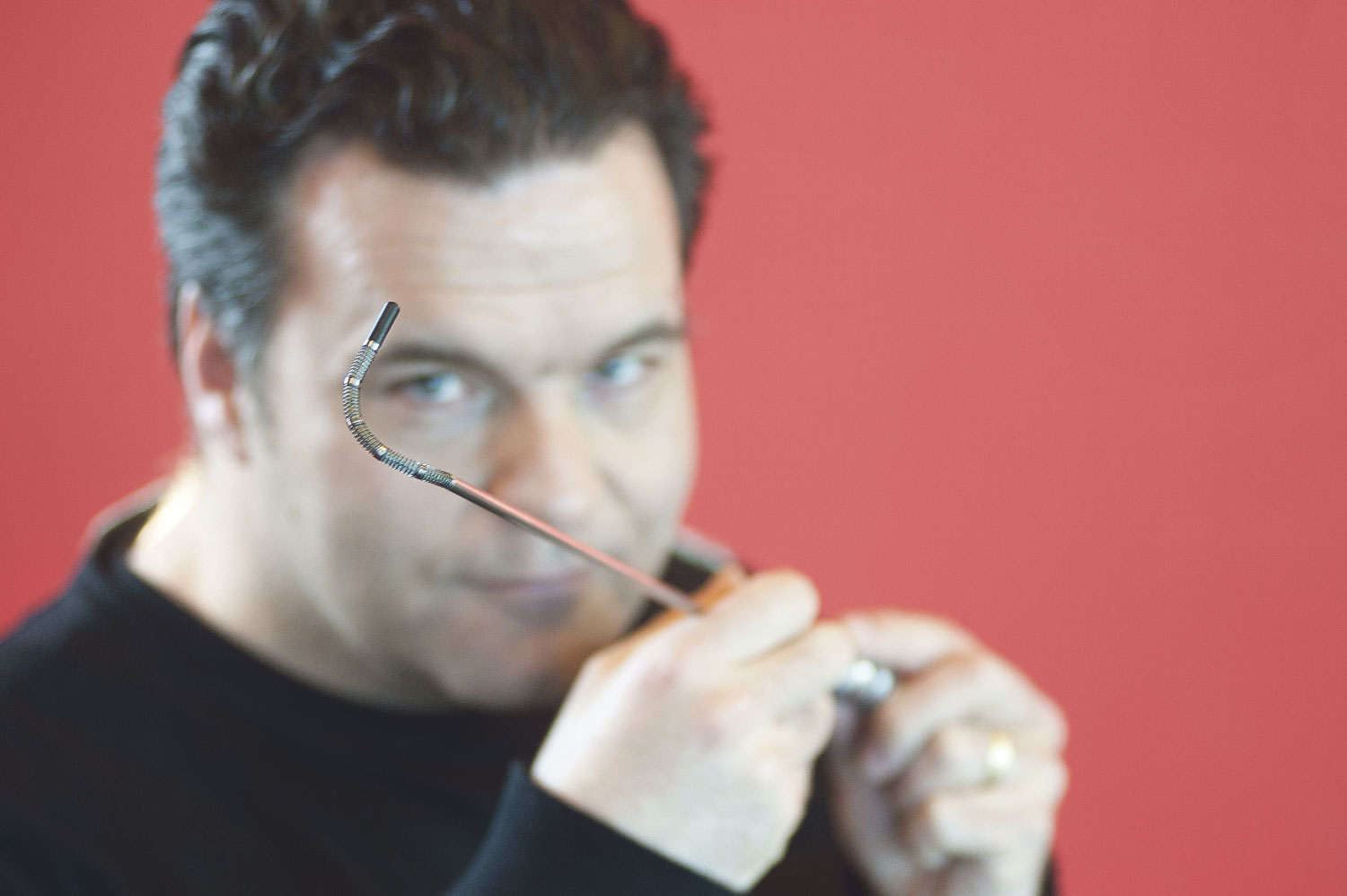Dr Paul Breedveld is developing a surgical tool that writhes around organs like a snake and then suddenly splits, turning itself into an octopus-like instrument deep inside the body.
Imagine a surgeon cutting away a tumour in the pituitary gland, located under the brain, deep inside the skull. The surgeon has all the required equipment at hand, including a pair of grippers, a scalpel, camera and light. One can perhaps imagine a skull that has been opened and the brain parts pulled aside –which is normal practice – yet here the patient seems completely intact.
When the procedure is finished, the surgeon pulls all of the equipment out through a tiny hole in the sphenoid bone (the same hole through which the instruments were inserted), located at the base of the skull, from where the surgical tools continue on through the patient’s nose.
This is how biomechanical engineer, Dr Paul Breedveld, envisions the future of brain surgery; by manoeuvring a surgical instrument consisting of numerous, extremely flexible arms through the nostrils into the head. Last week he received a Vici grant from the Netherlands Organisation for Scientific Research worth 1.5 million euros to develop such a tool.
Breedveld is inspired by the arms of squid and octopuses. Lacking hard skeletal support, the tentacles of these animals are composed of muscular hydrostats, which are ingenious compositions of interacting muscles arranged in layers, bundles and volumes. By selectively tensioning and releasing fibres, tentacles can be manoeuvred with adjustable stiffness in a remarkable variety of poses.
With the squid tentacles in mind, the researcher developed an instrument in 2004 comprising of a ring of steel cables, surrounded by coil springs, which can bend in all directions. He now aims to elaborate on this invention, making it multi-armed and thinner.
“The instrument you see here is hollow,” says Breedveld, while holding his patented surgical instrument in his hand. It allows for the electrical cables needed for a camera at the tip to run through the instrument, he explains. “What I want to do now is to manoeuvre the instrument not with a separate set of steel cables, but rather with the electrical cables themselves, making them multi-functional so that the instrument no longer needs to be hollow and can thus be thinner.”
“I also want to devise smart ways to allow surgeons to efficiently steer all the arms,” he adds. “Basically I want to copy an entire squid.”
Voor het hoger onderwijs hangt veel van deze verkiezingen af. De oppositie moet weinig hebben van de maatregelen tegen langstudeerders en kijkt ook met afgrijzen naar de tijdelijke bezuinigingen op hoger onderwijs. De linkse partijen zouden die plannen graag in de Eerste Kamer tegenhouden.
‘VVD ook tegen’
“We gaan daar heel kritisch naar kijken”, zei Marleen Barth, nummer één op de lijst van de PvdA voor de Eerste kamer. Ze liet er geen misverstand over bestaan dat ze tegen de boete is. Volgens haar zou regeringspartij VVD er eigenlijk ook niet achter staan en daar ziet ze dan ook kansen voor “een mooie samenwerking”.
Ook Tofik Dibi van GroenLinks noemde de langstudeermaatregel van het kabinet één van de plannen waar de senaat een stokje voor kan steken. “De coalitie zal open moeten staan voor onderhandelingen met de oppositie”, zei hij.
Voorzichtigheid
Aanvankelijk leken de coalitiepartijen op 35 zetels uit te komen: niet genoeg voor een meerderheid, ook niet als de SGP zou bijspringen. Maar in de loop van de avond bleek de uitslag voor de regering toch beter uit te pakken: 37 zetels in de voorlopige uitslag. Als de SGP meetelt, is er zelfs een meerderheid van 38 zetels. Ook de ouderenpartij 50Plus van Jan Nagel krijgt een zetel. Maar het is onduidelijk hoe die partij over hoger onderwijs denkt.
Voorzichtigheid is geboden, want het zijn getrapte verkiezingen: pas op 23 mei zullen de leden van de Provinciale Staten hun stem voor de Eerste Kamer uitbrengen. De uitkomst kan afwijken van de verkiezingsuitslag van gisteren, bijvoorbeeld als iemand een ongeldige stem uitbrengt of er dissidenten tussen de provinciale CDA’ers en VVD’ers zitten.
Deadline
Meerderheid of niet, het is nog niet zeker dat staatssecretaris Halbe Zijlstra zijn plannen op tijd door de Tweede en Eerste Kamer weet te loodsen. Er is nog maar weinig tijd voordat het nieuwe studiejaar begint en de Eerste Kamer neemt meestal de tijd om over een nieuwe wet te oordelen. Mocht hij de deadline missen, dan kan het verhoogde collegegeld voor langstudeerders pas een jaar later in rekening worden gebracht.



Comments are closed.